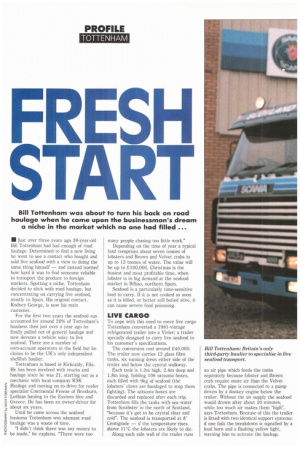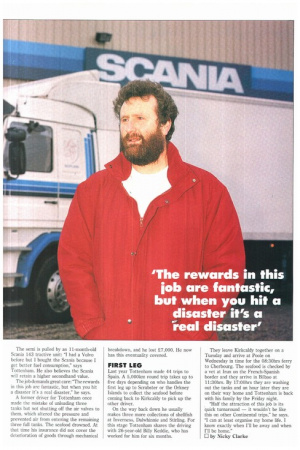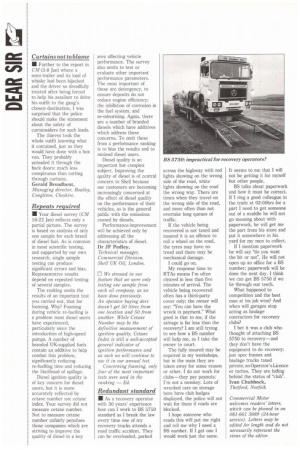F RESH S T A R T Bill Tottenham was about to turn his back
Page 42

Page 43

Page 44

If you've noticed an error in this article please click here to report it so we can fix it.
on road haulage when he came upon the businessman's dream a niche in the market which no one had filled ...
• Just over three years ago 39-year-old Bill Tottenham had had enough of road haulage. Determined to find a new living he went to see a contact who bought and sold live seafood with a view to doing the same thing himself — and instead learned how hard it was to find someone reliable to transport the produce to foreign markets. Spotting a niche, Tottenham decided to stick with road haulage, but concentrating on carrying live seafood, mostly to Spain. His original contact, Rodney George, is now his main customer.
For the first two years the seafood run accounted for around 20% of Tottenham's business then just over a year ago he finally pulled out of general haulage and now devotes a vehicle soley to live seafood. There are a number of own-account operators in the field but he claims to be the UK's only independent shellfish haulier.
Tottenham is based in Kirkcaldy, Fife. He has been involved with trucks and haulage since he was 21, starting out as a mechanic with local company KSK Haulage and moving on to drive for reefer specialist Continental Freeze of Broxburn, Lothian hauling to the Eastern bloc and' Greece. He has been an owner-driver for about six years.
Until he came across the seafood business Tottenham was adamant road haulage was a waste of time.
"I didn't think there was any money to be made," he explains. "There were too
many people chasing too little work."
Depending on the time of year a typical load comprises about seven tonnes of lobsters and Brown and Velvet crabs in up to 13 tonnes of water. The value will be up to £100,000. Christmas is the busiest and most profitable time, when lobster is in big demand at the seafood market in Bilbao, northern Spain, Seafood is a particularly time-sensitive load to carry. If it is not cooked as soon as it is killed, or better still boiled alive, it can cause severe food poisoning.
LIVE CARGO
To cope with this need to move live cargo Tottenham converted a 1981-vintage refrigerated trailer into a Vivier; a trailer specially designed to carry live seafood to his customer's specifications.
The conversion cost around £40,000. The trailer now carries 12 glass fibre tanks, six running down either side of the trailer and below the central walkway.
Each tank is 1.2m high, 2,4m deep and 1.8m long, holding 106 satsuma boxes, each filled with 9kg of seafood (the lobsters' claws are bandaged to stop them fighting). The satsuma boxes are discarded and replaced after each trip. Tottenham fills the tanks with sea water from Scrabster in the north of Scotland, "because it's got to be crystal clear and cold". The seafood is transported at 8° Centigrade — if the temperature rises above 11°C the lobsters are likely to die.
Along each side wall of the trailer runs an air pipe which feeds the tanks separately because lobster and Brown crab require more air than the Velvet crabs. The pipe is connected to a pump driven by a donkey engine below the trailer. Without the air supply the seafood would drown after about 20 minutes, while too much air makes them "high", says Tottenham. Because of this the trailer is fitted with two identical support systems: if one fails the breakdown is signalled by a loud horn and a flashing yellow light, warning him to activate the backup. The semi is pulled by an 11-month-old Scania 143 tractive unit: "I had a Volvo before but I bought the Scania because I get better fuel consumption," says Tottenham. He also believes the Scania will retain a higher secondhand value.
The job demands great care: "The rewards in this job are fantastic, but when you hit a disaster it's a real disaster," he says.
A former driver for Tottenham once made the mistake of unloading three tanks but not shutting off the air valves to them, which altered the pressure and prevented air from entering the remaining three full tanks. The seafood drowned. At that time his insurance did not cover the deterioration of goods through mechanical breakdown, and he lost £7,000. He now has this eventuality covered.
FIRST LEG
Last year Tottenham made 44 trips to Spain. A 5,000km round trip takes up to five days depending on who handles the first leg up to Scrabster or the Orkney Islands to collect the seafood before coming back to Kirkcaldy to pick up the other driver.
On the way back down he usually makes three more collections of shellfish at Inverness, Dalwhinnie and Stirling. For this stage Tottenham shares the driving with 26-year-old Billy Keddie, who has worked for him for six months. They leave Kirkcaldy together on a Tuesday and arrive at Poole on Wednesday in time for the 08:30hrs ferry to Cherbourg. The seafood is checked by a vet at lrun on the French-Spanish border and they arrive in Bilbao at 11:30hrs. By 17:00hrs they are washing out the tanks and an hour later they are on their way home and Tottenham is back with his family by the Friday night.
"Half the attraction of this job is its quick turnaround — it wouldn't be like this on other Continental trips," he says. "I can at least organise my home life. I know exactly when I'll be away and when I'll be home."
El by Nicky Clarke
• Further to the report in CM (3-8 Jan) where a semi-trailer and its load of whisky had been hijacked and the driver so dreadfully treated after being forced to help his assailant to drive his outfit to the gang's chosen destination, I was surprised that the police should make the statement about the safety of curtainsiders for such loads.
The thieves took the whole outfit knowing what it contained, just as they would have done with a box van. They probably unloaded it through the back doors: much less conspicuous than cutting through curtains.
Gerald Broadbent, Managing director, Boalloy, Con gleton, Cheshire.
Repeats required
• Your diesel survey (CM 16-22 Jan) reflects only a partial picture. The survey is based on analysis of only one sample for each brand of diesel fuel. As is common in most scientific testing, and supported by our own research, single sample testing can produce significant errors and bias. Representative results depend on repeated testing of several samples.
The ranking omits the results of an important test you carried out, that for foaming. Why? Foaming during vehicle re-fuelling is a problem most diesel users have experienced, particularly since the introduction of high-speed pumps. A number of branded UK-supplied fuels contain an additive to help combat this problem, significantly reducing re-fuelling time and reducing the likelihood of spillage.
Diesel ignition quality is of key concern for diesel users, but it is more accurately reflected by cetane number not cetane index. Your survey did not measure cetane number. Not to measure cetane number unfairly penalises those companies which are striving to improve the quality of diesel in a key area affecting vehicle performance. The survey also omits to test or evaluate other important performance parameters. The most important of these are detergency, to ensure deposits do not reduce engine efficiency; the inhibition of corrosion in the fuel system, and re-odourising. Again, there are a number of branded diesels which have additives which address these concerns. To omit these from a performance ranking is to bias the results and to mislead diesel users.
Diesel quality is an important but complex subject. Improving the quality of diesel is of central concern to Shell because our customers are becoming increasingly concerned at the effect of diesel quality on the performance of their vehicles, as is the general public with the emissions caused by diesels.
Performance improvement will be achieved only by addressing all the characteristics of diesel. Dr 3F Pedley, Technical manager, Commercial Division, Shell UK Oil, London.
0 We stressed in our feature that we were only testing one sample from each oil company, as we have done previously.
An operator buying dery doesn't get 50 litres from one location and 50 from another. While Cetane Number may be the definitive measurement of ignition quality, Cetane Index is still a well-accepted general indicator of ignition performance and as such we will continue to use it in our annual test.
Concerning foaming, only four of the most important tests were used in the ranking — Ed.
As a recovery operator with 30 years' experience how can I work to BS 5750 standard as I break the law every time one of my recovery trucks attends a road traffic accident. They can be overloaded, parked across the highway with red lights showing on the wrong side of the road, white lights showing on the road the wrong way. There are times when they travel on the wrong side of the road, and more often than not overtake long queues of traffic.
If the vehicle being recovered is not taxed and insured it is an offence to roll a wheel on the road, the tyres may have no tread and there may be mechanical damage.
I could go on.
My response time to RTAs means I'm often cleared in less than five minutes of arrival. The vehicle being recovered often has a third-party cover only; the owner will say: You can have the wreck in payment." What good is that to me, if the salvage is far less than the recovery? I am still trying to see how a BS number will help me, as [take the owner to court.
The fully insured may be repaired in my workshops, but in the main they are taken away for some reason or other. I do not work for clubs—they pay peanuts; I'm not a monkey. Lots of wrecked cars on storage here have club badges displayed, the police will not wait for them if roads are blocked.
I hope someone who reads this will put me right and tell me why I need a BS number. If I get one I would work just the same. It seems to me that I will not be getting it for myself but other people.
BS talks about paperwork and how it must be correct. If I ring a good colleague in the trade at 02:00hrs for a part I need to get someone out of a muddle he will not go messing about with paperwork, he will get me the part from his store and put it somewhere in his yard for my men to collect.
If! mention paperwork he will say "do you want the bit or not". He will not open up an office for a BS number; paperwork will be done the next day. I think we can get BS 5750 if we lie through our teeth.
What happened to competition and the best man at his job wins? And when will garages stop acting as haulage contractors for recovery clubs?
I bet it was a club who thought of attaching BS 5750 to recovery—and they don't have the equipment to do recovery: just spec frames and haulage trucks taxed private, no Operator's Licence or tachos. They are hiding behind the status of "club". Ivan Chubbock, Thetford, Norfolk.
Commercial Motor welcomes readers' letters, which can be phoned in on 081-661 3689 (24-hour service). Letters may be edited for length and do not necessarily represent the views of the editor.




































































































